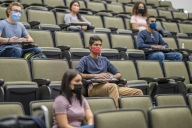You have /5 articles left.
Sign up for a free account or log in.
Two years ago, Michael J. Sorrell was giving a speech to the student body when he noticed one of his favorite students in the front row. Despite sitting only 25 feet or so from Sorrell, the student was squinting to see him.
Sorrell, president of the historically black Paul Quinn College in Dallas, stopped the speech and asked how many students would go to the eye doctor if he made the arrangements.
It turned into more than just a poll. Between 10 and 15 percent of students needed glasses and lacked the means to get them or have their eyes examined. Not anymore.
Sorrell and his wife, Natalie, set up the optometrist appointments and pitched in to cover those costs. They raised money for the glasses through the college’s website and social media accounts. In 10 days, they had $5,000.
“It was pretty remarkable – we were blown away,” Sorrell said. “The students haven’t paid a dime for the past two, two and a half years. Every student who needed glasses has got them.”
Sorrell knows it’s made a big difference for those 75 or so students whose vision was severely limiting their classroom experience – because he’s seen their prescription strength. For some, it’s meant the difference between going to class and often skipping out. He described one in particular.
“His head hurt, he couldn’t concentrate, and he just kind of lost hope a little bit – and that was because he couldn’t see correctly. It had been that way for years so he’d come to experience this as his new normal,” Sorrell said.
Then he got a new new normal.
“His grades – I wish I could tell you he went from a 1.8 to a 3.9. That’s not quite the case. But he has gone from a student who really would have struggled to graduate to being someone who is very much in a place that he’s comfortable in the classroom, and he’s comfortable trying. And he’s also a student that it has made a big difference to him just to know someone cared enough to help.”
Ronisha Isham, a junior from Oklahoma, has had problems with her vision for pretty much her whole life. She used to have trouble seeing even at the front of the classroom. With glasses, her eyesight has greatly improved -- and so have her grades.
"Coming to a school where people who are in charge actually care about their students, and trying to find a solution to the problem -- that made me feel really good," Isham said. "Because I've never had that happen to me before. And I'm glad that I have them; I'm grateful."
The story of how this came to be is “fascinating” to Elizabeth Child, dean of the College of Arts and Sciences at Trinity Washington University, a minority-serving institution enrolling many low-income students in Washington, D.C.
“I think that’s a testament to being alert when you’re interacting with students, just being alert to everything that you see – not only what they’re saying or doing but also what they’re telling you through their body language and other kinds of signals,” Child said. “Whenever a college or a university can support students – especially students who face financial challenges with materials or health care services, or really any kind of resource that will help them get a better academic outcome – that is wonderful; that’s to be praised to the skies.”
Trinity hasn’t noticed this particular issue in its student body, but it does require all new students to do an orientation workshop with health and wellness staff. Officials also know that 10 to 15 percent of the 1,100 students at the all-female College of Arts and Sciences have children or are expecting, so counselors started a Mothers’ Support Group that meets monthly, and work with students individually to help them balance school and other responsibilities – and, ultimately, stay on track to graduation.
Like others, Child said, Trinity “has to do some prioritizing in how resources are allocated, but I think it’s very important to figure out what your students need so that they can be successful in the classroom – whether that’s glasses, or the flu vaccine, which we give away free every year, or access to technology if they don’t have their own technology. All of those things are extremely important,” she said. “We wish we could afford to do everything, but of course, we can’t.”
Child noted the importance of simply making sure students have the information they need – the fact that flu shots are even available, for instance. And Sorrell said many of the students who needed glasses don’t necessarily lack them only for financial reasons -- they just don’t know how to go about getting them.
For Sorrell, making sure they do isn’t just about making sure they’re following along in class.
“If you educate a student population that comes from the types of socioeconomic backgrounds as ours, you understand when you make a choice to be in this environment that you have a responsibility to stand in the gap,” Sorrell said. “I went to Oberlin and Duke. We didn’t do those things. These aren’t those students, but that doesn’t mean they can’t become those adults.”

![First text message: "Yes?" Second message: "This is embarrassing to say, but law school isn't fair for us men, the women are always outperforming us at [sic]. It's obvious women are taking over the legal profession nowadays." Third text: "Who is this?"](/sites/default/files/styles/image_192_x_128/public/2024-09/Text_messages_law_2.jpg?itok=0QWP419B)






